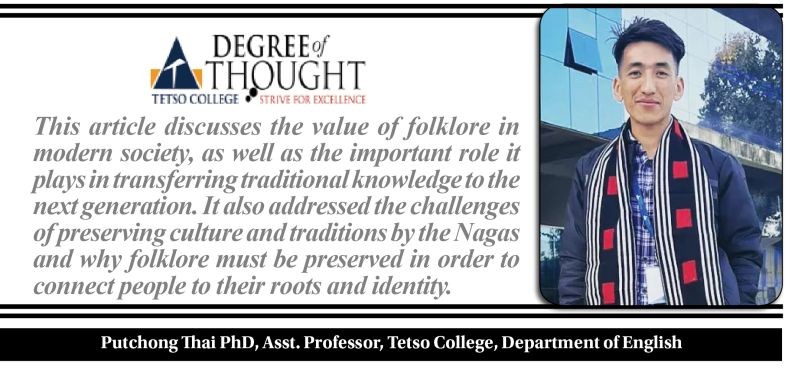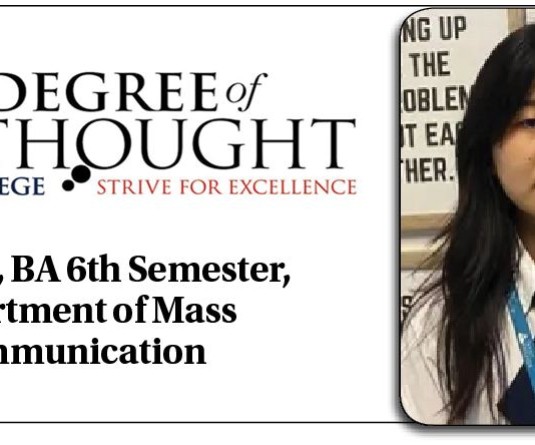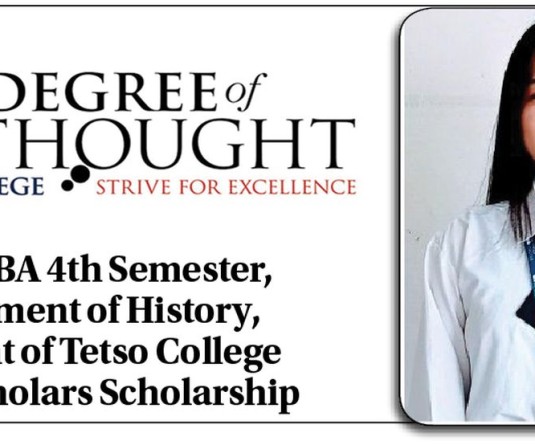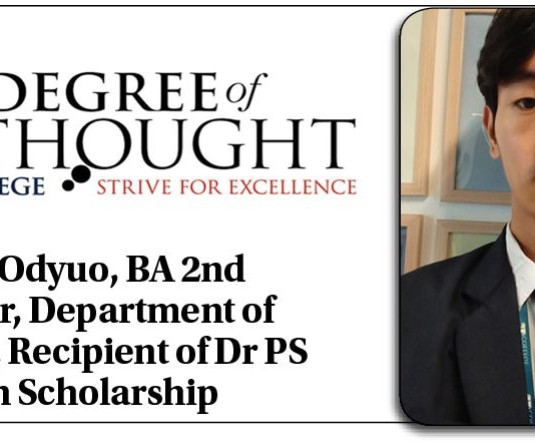
The term "folklore" was coined by the English antiquarian William John Thoms in 1846 (Krappe xv). The subject of folklore is an enduring social way of life that approached the traditional beliefs and stories of a community. It includes folktales, folk songs, myths, legends, beliefs, practices, etc. Traditions are passed down from generation to generation, bringing long-forgotten cultures and traditions to life. The folklore of a particular group of people is built in accordance with their culture. The traditional past stories also reflect one’s image, identifying a person’s way of life in a given society. While society represents the social norms and behaviors that discipline an individual according to its sets of principles. And society comprises people with certain aims and objectives to achieve through the participation of people in all spheres of life.
Nagas continue to live in an oral society where folklore serves as the chief source of information to tell the unique culture and history of the people. Thus, folklore in contemporary society has a significant role in imparting traditional knowledge that can increase our appreciation for literature. The Nagas, apart from being the victims of modernity, which mostly deals with the advancement of science and technology, continue to live and follow the legacies left by our ancestors. Conflicts between culture and religion, accepting realities, and preserving oral literature are all major challenges that Naga societies face today. To understand the distinctive features of its tribal land, history, culture, and native people's way of life, one must ultimately be conscious of and value the rich and unique cultural identity.
During the primitive age, as we learned through folklore, the ritual practices on every occasion occupied an important place in the lives of our forefathers. For instance, during festivals, celebrations, head-hunting expeditions, harvest, and while naming a child, performing rituals, and worshipping the supernatural beings and "great god," what we called, Lichaba and Koa in Ao and Khiamniungan Naga, respectively, was paramountly important. They were very honest, sincere, and hard-working warriors. They uttered the truth and had genuine sympathies for their fellow beings. And they knew, deep down, that there is only one "Great God," whom we refer to as "Almighty.". Subsequently, our great-grandparents were blessed and granted an abundance of life.
Like in the days of yore, religion plays a vital role in day-to-day life. The acceptance of Christianity in our land has brought tremendous changes and impacted the lives of many people, who would not have known the existence of that one true "Great God" otherwise. The Christian faith and belief systems: the hymns that we sing in the church, the dresses that we wear today, and knowing the concept of Heaven and Hell were not our forefathers' practices and ideas that were instilled in us. However, the introduction of western education and the arrival of Christianity in our forefathers' land was not only responsible for teaching us how to read and write, but also for helping us build a free and just society and compete with the rest of the world.
The Nagas considered belief systems and ritual practices as sacred natural phenomena in their connection to culture and traditions. Nevertheless, today, culture and religion are antitheses to each other, in the sense that culture and tradition deal with one’s existence, they tell us who we are and where we come from, while religion, on the other hand, tells us about one’s belief system that concerns redemption and spiritual life, and is assorted and often misinterpreted. It leads to diminishing our culture and beautiful traditions. Lack of education and the influences of western culture, as well as the name of a modern belief system, caused most of the native people to fail to understand the value of culture. Many churches do not encourage sharing the practices and knowledge of our culture and traditions. And, in many cases, they are believed and considered to be sinful. Consequently, the upcoming generation progresses with less knowledge or knows nothing about their cultural identity. It is a daunting challenge for contemporary Naga society to distinguish between the traditional past and today’s modern religious practices, which in turn would pave the way for a better way of life for the younger generation.
Lamenting over the vanishing culture of the Nagas, Khillo G. Rengma in his preface to the book entitled, "A Walk Down Memory Lane – Folk Tales and Stories of the Rengma Nagas says, "Many Nagas are forgetting their language, and if this trend continues, all the tribal’s rich cultures and folklore would be forgotten. (Khillo, 2014, p-4)"With the introduction of western education, our system of oral narration suffers," says the above statement, which calls on the Nagas and makes an earnest plea for collective responsibility to preserve "the tribe's rich cultures and folklore."
When we revisit our forefathers' rich culture and traditions, there is nothing left without a story to tell. Today, we have lost the sense of belongingness, sympathy, mutual relationships, deserved respect, and truth. We need to go back to the roots, and emphasize the preservation of our distinct culture, language, and traditions. It is still possible to keep our culture alive, and our traditions handed down from one generation to another. However, we need to develop a new perspective and reconsider that we are not the destroyers and ignorant of our culture, but rather its protectors, producers, and caretakers.
Folklore must continue to be preserved to bridge people with their respective cultures and traditions. J.P Mills truly stated in his book, The Ao Nagas, "The past is being allowed to die." "But the old men still tell the old stories" (Mills, 1926: p. 307). This piece of writing sums up the genuine and compelling words of Dr. V. K. Nuh, in his book, Struggle for Identity In North-east India: "I deeply believed that something is missing in the present North East India society and that something would be none other than ‘culture’. That is the reason why young people are fighting on the streets, frustrated with a feeling of emptiness. Life has become as dry as a desert. In all of this, we have to come back to our roots and our culture.
The Degree of Thought Column is a weekly community column initiated by Tetso College in partnership with The Morung Express. The column explored contemporary social, cultural, political, and educational issues and challenges around us. However, the views expressed here do not reflect the opinion of the institution. Tetso College is a NAAC-accredited, UCG-recognized Commerce and Arts college. Currently, the Degree of Thought Column is managed by the department of Mass Communication, and the editorial team are Dr Jenny Lalmuanpuii, KC Gabriela and Rinsit Sareo. For feedback or comments, please email: dot@tetsocollege.org.






